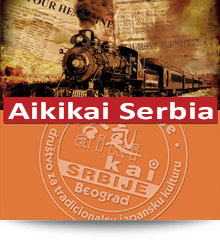Home / Events / Impressions and trips 2001 - 2017 / Discovering the True Richness in Serbia, the Country Surrounded with Gentleness
Discovering the True Richness in Serbia, the Country Surrounded with Gentleness
Masaaki Dan
Masaaki Dan, Colonel,
Defense Attaché at the Japanese Embassy in Serbia, student of Doshu and 3rd Dan so Hombu.
The Defense attachés stay in different countries and collect information in the assigned country.
Despite of struggling the different lifestyles and cultures, they are active in their role.
In this issue, Colonel Dan, who lives in Serbia where scars from the conflicts are still remained, gives a report.
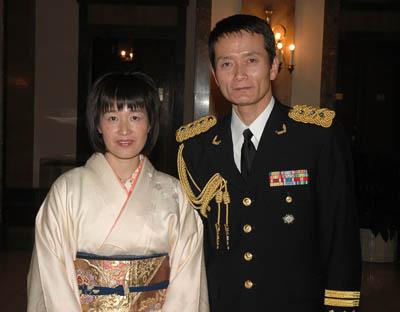
In May 2006 when it was busy to prepare for moving prior to my assignment in Serbia, my children complained with tears, “Do we really have to go to Serbia? We do not want to be apart from friends and do not want to go to a place that we do not know.” Because my knowledge about Serbia was poor at that time, I could not explain them enough. But, I have decided to take them to Serbia almost forcefully. I still remember children’s faces looking at the land of Japan from the airplane which departed from the Narita Airport on June 22nd.
Serbia, the country where people are the full of heart, even after the several wars.
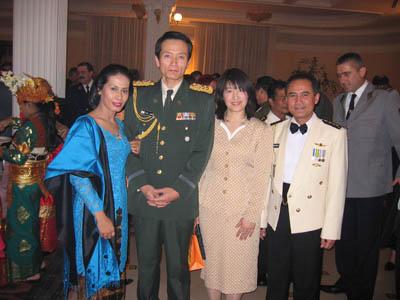
Although I assume that many Japanese people who do not know the country name itself, Serbia, those words of the former Yugoslavia, Belgrade, and the President Tito may help to come up with the image. The former Yugoslavia used to be the country which did not belong to either the East or West blocks and took a role like a leader of non-alliance movement. But, it spread into 5 countries (Slovenia, Croatia, Bosnia and Herzegovina, Serbia and Montenegro, and Macedonia) in 1990’s. In June 2006 Montenegro became an independent state and the Republic of Serbia was formed. Serbia experienced many wars which cannot be excluded from its history. In the recent history, it is fresh memory of the Bosnia and Herzegovina conflict in 1992 which killed about 200,000 people and the Kosovo conflict which has become serious since 1998 and even now there are 16,000 soldiers of the International military teams are posted. Today, the independence of Kosovo which is under the UN Kosovo provisional administration mission has been discussed at the International arena. Also, Belgrade, the capital, has been the place of battle fields, so that most of the beautiful buildings have been destroyed and there are few remained as of now. Especially, the NATO air bombing in 1999 made the land devastated and there are miserable scars remained in Belgrade which tells the significant of the air bombing at that time. On the other hand, it’s been construction boom in past a few years, so that the city shows mysterious outlook of combination between destruction and creation.
Many people in general may assume that Serbians are aggressive ethnicity by untying the Serbian history. However, despite of miserable wars and various International sanctions, Serbian people are cheerful and good hearted and are full of warm heart even among Europeans. Only the strong personality (especially women) and stubbornness are not comparative to those of Japanese people. Serbian people take good care of their tradition and are good at enjoying their own time. Belgrade is lively contracting to the destroyed building from the air bombing. The night town is prosperous and many people enjoy listening to traditional music at restaurants. Also, the first thing made me surprise was the beautiful women. Walking through the downtown, I see the excellent style of Serbian women who seem to come out from the fashion magazine. Also, the Serbian security is good and the downtown Belgrade excluding only one area is safe for a child to walk around alone. Can you imagine if your child, let’s say a teenager, walk around alone in downtown Shinjuku in the middle of night? My daughter often takes a taxi alone, but my wife and I as parents are not afraid of it. She talks to Serbian taxi drivers, who like Japanese people very much and who also love to talk, in basic English with gestures.
Toward peace from now on with people who live with rich heart.
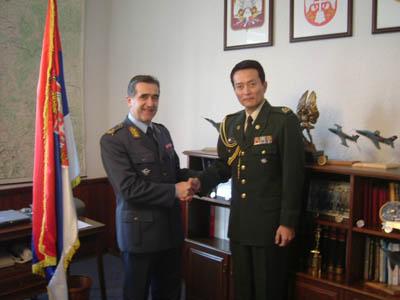 The average monthly income in Serbia is about 360 Euros (About 58,000 yen). Compare to Japan, it is unbelievable low income. In addition, there are 1,550,000 pensioners in Serbia. It is true that the cost of living is cheep, especially food is very cheep compare to Japan, for example a beer costs 50 yen, a loaf of big French bread also costs around 50 yen. However, the gasoline costs 160 yen/liter and those imported goods and furniture are expensive. But, I do not feel the miserable sense of living from Serbian people. Especially, since evening, many families and couples take a walk at pedestrian path along the Dunav River and some drink glasses of wine on a boat restaurant while watching the sunset. Looking at them made me feel that “they live luxury”. In many times the Serbian persons who live in other areas invited me and I visited them. I see the rich life at every time. They are not financially in a good shape. Cultivating vegetables in a field within a large ground and taking care of pigs, caws, chickens, dogs, and cats, producing home made distilled alcohol (rakija), and all the generation from grandparents to ground children live in a same place with continuous laughing atmosphere, the food they hosted me were all home made meat dishes, soup, vegetable dishes, and rakija. Everyone laughs cheerfully with eating delicious food and drinking home made rakija, and getting drunk merrily, singing, and dancing. Before we knew, our family were also caught by that atmosphere and naturally joined in the dancing circle even not knowing how to dance and tapped steps. This kind experience, I feel, allowed me to see Serbian secret of enjoying life. Compare to today’s Japan, Serbia is not rich in terms of material and finance, but I think that Serbian are the people who posses the skill of living rich life. Off cause, urbanization, westernization, and young people’s culture are progressive in Serbia, so that its life style and mentality are also gradually changing.
The average monthly income in Serbia is about 360 Euros (About 58,000 yen). Compare to Japan, it is unbelievable low income. In addition, there are 1,550,000 pensioners in Serbia. It is true that the cost of living is cheep, especially food is very cheep compare to Japan, for example a beer costs 50 yen, a loaf of big French bread also costs around 50 yen. However, the gasoline costs 160 yen/liter and those imported goods and furniture are expensive. But, I do not feel the miserable sense of living from Serbian people. Especially, since evening, many families and couples take a walk at pedestrian path along the Dunav River and some drink glasses of wine on a boat restaurant while watching the sunset. Looking at them made me feel that “they live luxury”. In many times the Serbian persons who live in other areas invited me and I visited them. I see the rich life at every time. They are not financially in a good shape. Cultivating vegetables in a field within a large ground and taking care of pigs, caws, chickens, dogs, and cats, producing home made distilled alcohol (rakija), and all the generation from grandparents to ground children live in a same place with continuous laughing atmosphere, the food they hosted me were all home made meat dishes, soup, vegetable dishes, and rakija. Everyone laughs cheerfully with eating delicious food and drinking home made rakija, and getting drunk merrily, singing, and dancing. Before we knew, our family were also caught by that atmosphere and naturally joined in the dancing circle even not knowing how to dance and tapped steps. This kind experience, I feel, allowed me to see Serbian secret of enjoying life. Compare to today’s Japan, Serbia is not rich in terms of material and finance, but I think that Serbian are the people who posses the skill of living rich life. Off cause, urbanization, westernization, and young people’s culture are progressive in Serbia, so that its life style and mentality are also gradually changing.
I sometimes hear that the former Yugoslavian military was powerful, on the other hand, what about the current Serbian military? Last year, the Republic of Serbia became to posses its own military headed by the president. But the Serbian military faces many problems such as a shortage of applicants due to military unpopularity in addition to the absolute lack of military budget, decrepit of equipment and what to do with massive volume of surplus weapons. In order for the Serbian military to become suitable to the its national strength, the Serbian military is in the process of the national defense reform. By the end of 2010, it aims to reduce down to 27,000 solders and to the professional military system as abolishing the conscription system. Damaged a lot by the NATO air bombing in 1999 and received lots of minus inheritances, the Serbian military’s rebuilding is not easy. Evaluating at the physical standard, one cannot say that today’s Serbian military is strong. But, within a few years, its cooperation with NATO has rapidly increased and the reform has been done based on the NATO standards. But, because the memory of the air bombing in 1999 may have not been erased, the half of Serbian population is against joining to NATO. For example, when the Serbian military shot down an American F117 fighter airplane during the air bombing, those Serbian civilians held demonstrations with hoisting placards saying “Sorry, did not know that it was invisible.”
Children’s words made me realize how Serbia as a country is fascinating.
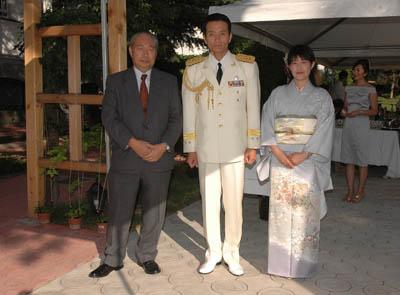 When it’s been one year since our departure from Japan in 2006, we went back to Japan for a visit in August 2007. During the time in Belgrade, children spend everyday struggling with English at the International School. For the first few months, they could not finish their homework by the midnight everyday. Especially, the youngest daughter came to Serbia when she was in the 6th grade (In Japan, studying English starts in the 7th grade.), she did not know anything about English. But, three weeks has past during our visit to Japan in August 2007, she told me, “Father, lets go back to Serbia. Serbia is better.” One year ago, children hated going to Serbia and looked at the land of Japan with sentimental and at a loss. But, the same children told me that they want to go back to Serbia. I could not figure out what of Serbia made them say so. I, however, committed to myself, “for the next two years, I will make sure that my family complete living in Serbia with satisfaction and all of us go back to Japan with good health and mind.” I assume that there are various reasons which made children this much, but I think, above all it is because very thoughtful Serbia and its people. I really appreciate Serbia and its people as my children could grow up as this level. Would you like to visit the wonderful country, Serbia? I believe that it can wrap you to rest with gentleness, so that your fatigue can be cured. And, Serbia can bring you back to your true gentleness.
When it’s been one year since our departure from Japan in 2006, we went back to Japan for a visit in August 2007. During the time in Belgrade, children spend everyday struggling with English at the International School. For the first few months, they could not finish their homework by the midnight everyday. Especially, the youngest daughter came to Serbia when she was in the 6th grade (In Japan, studying English starts in the 7th grade.), she did not know anything about English. But, three weeks has past during our visit to Japan in August 2007, she told me, “Father, lets go back to Serbia. Serbia is better.” One year ago, children hated going to Serbia and looked at the land of Japan with sentimental and at a loss. But, the same children told me that they want to go back to Serbia. I could not figure out what of Serbia made them say so. I, however, committed to myself, “for the next two years, I will make sure that my family complete living in Serbia with satisfaction and all of us go back to Japan with good health and mind.” I assume that there are various reasons which made children this much, but I think, above all it is because very thoughtful Serbia and its people. I really appreciate Serbia and its people as my children could grow up as this level. Would you like to visit the wonderful country, Serbia? I believe that it can wrap you to rest with gentleness, so that your fatigue can be cured. And, Serbia can bring you back to your true gentleness.
This article was published in Japanese magazine in late 2007.
translate from Japanese:
Kanoko Tsuda
